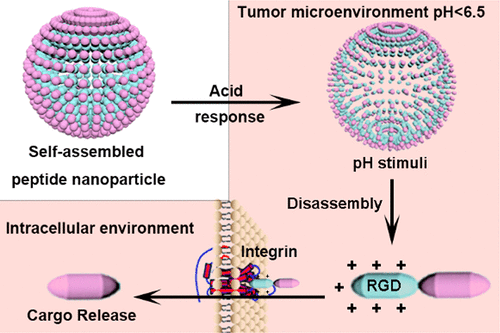当前位置:
X-MOL 学术
›
Chem. Mater.
›
论文详情
Our official English website, www.x-mol.net, welcomes your feedback! (Note: you will need to create a separate account there.)
Peptide-Induced Self-Assembly of Therapeutics into a Well-Defined Nanoshell with Tumor-Triggered Shape and Charge Switch
Chemistry of Materials ( IF 8.6 ) Pub Date : 2018-09-21 00:00:00 , DOI: 10.1021/acs.chemmater.8b02572 Wangxiao He 1, 2, 3 , Jin Yan 4, 5 , Wei Jiang 2 , Shichao Li 1 , Yiping Qu 2 , Fan Niu 1, 3 , Yuwei Yan 1 , Fang Sui 2 , Simeng Wang 2 , Yi Zhou 6 , Liang Jin 6 , Yujun Li 2 , Meiju Ji 7 , Peter X. Ma 4 , Min Liu 6 , Wuyuan Lu 3 , Peng Hou 2
Chemistry of Materials ( IF 8.6 ) Pub Date : 2018-09-21 00:00:00 , DOI: 10.1021/acs.chemmater.8b02572 Wangxiao He 1, 2, 3 , Jin Yan 4, 5 , Wei Jiang 2 , Shichao Li 1 , Yiping Qu 2 , Fan Niu 1, 3 , Yuwei Yan 1 , Fang Sui 2 , Simeng Wang 2 , Yi Zhou 6 , Liang Jin 6 , Yujun Li 2 , Meiju Ji 7 , Peter X. Ma 4 , Min Liu 6 , Wuyuan Lu 3 , Peng Hou 2
Affiliation

|
Peptide-tuned self-assembly of macromolecular agents (>500 Da) such as therapeutic peptides offers a strategy to improve the properties and biofunctions of degradable nanomaterials, but the tough requirement of macromolecular therapeutics delivery and a lack of understanding of peptide-based self-assembly design present high barriers for their applications. Herein, we developed a new strategy for nanoengineering macromolecular drugs by an elaborate peptide, termed PSP (VVVVVHHRGDC), capable of directly conjugating with cargo to be a PSP-cargo monomer as building block tending to self-assemble into a well-defined nanoshell with tumor-triggered shape and charge switch. As a proof of concept, conjugation PSP to a D-peptide activator of tumor suppressor p53 termed DPMI (1492.5 Da) generated hollow spheres ∼80 nm in diameter named PSP-DPMI that disintegrated only in the acidic microenvironment of tumor tissues, followed by integrin-mediated cellular uptake of PSP-DPMI monomers. Importantly, PSP-based self-assembly successfully endowed the DPMI with long circulation time and high cancer-cell-specific intracellular accumulation. PSP-DPMI nanoshells potently inhibited tumor growth in vitro and in vivo by the p53 restoration, while maintaining a highly favorable in vivo safety profile. Out of conventional encapsulation and conjugation, our study showcases a clinically viable novel method to nanoengineer macromolecular agents such as peptide for anticancer therapy and provides a hazard-free alternative strategy for the theranostics delivery.
中文翻译:

肽诱导的药物自组装成具有肿瘤触发形状和电荷开关的定义良好的纳米壳
大分子试剂(> 500 Da)的肽调谐自组装(例如治疗性肽)提供了改善可降解纳米材料的特性和生物功能的策略,但是对大分子治疗剂的递送提出了苛刻的要求,并且缺乏对基于肽的自我治疗的理解组装设计对其应用提出了很高的障碍。本文中,我们开发了一种新的策略,通过精心设计的肽PSP(VVVVVHHRGDC)来对大分子药物进行纳米工程改造,该肽能够与货物直接结合成为PSP货物单体,因为其构建基块倾向于自组装成具有明确定义的纳米壳,肿瘤触发的形状和电荷开关。作为概念的证明,将PSP与肿瘤抑制因子p53的D肽激活剂缀合,称为DPMI(1492.5 Da)产生直径约80 nm的中空球,称为PSP- D PMI,该球仅在肿瘤组织的酸性微环境中崩解,随后整合素介导的PSP- D PMI单体对细胞的吸收。重要的是,基于PSP的自组装成功赋予D PMI较长的循环时间和高的癌细胞特异性细胞内积累。PSP- DPMI纳米壳通过p53修复可有效抑制肿瘤在体外和体内的生长,同时保持高度有利的体内安全性。通过传统的封装和结合,我们的研究展示了一种临床可行的新颖方法,可用于纳米工程大分子试剂(例如用于抗癌肽的肽),并为治疗诊断法提供了无危险的替代策略。
更新日期:2018-09-21
中文翻译:

肽诱导的药物自组装成具有肿瘤触发形状和电荷开关的定义良好的纳米壳
大分子试剂(> 500 Da)的肽调谐自组装(例如治疗性肽)提供了改善可降解纳米材料的特性和生物功能的策略,但是对大分子治疗剂的递送提出了苛刻的要求,并且缺乏对基于肽的自我治疗的理解组装设计对其应用提出了很高的障碍。本文中,我们开发了一种新的策略,通过精心设计的肽PSP(VVVVVHHRGDC)来对大分子药物进行纳米工程改造,该肽能够与货物直接结合成为PSP货物单体,因为其构建基块倾向于自组装成具有明确定义的纳米壳,肿瘤触发的形状和电荷开关。作为概念的证明,将PSP与肿瘤抑制因子p53的D肽激活剂缀合,称为DPMI(1492.5 Da)产生直径约80 nm的中空球,称为PSP- D PMI,该球仅在肿瘤组织的酸性微环境中崩解,随后整合素介导的PSP- D PMI单体对细胞的吸收。重要的是,基于PSP的自组装成功赋予D PMI较长的循环时间和高的癌细胞特异性细胞内积累。PSP- DPMI纳米壳通过p53修复可有效抑制肿瘤在体外和体内的生长,同时保持高度有利的体内安全性。通过传统的封装和结合,我们的研究展示了一种临床可行的新颖方法,可用于纳米工程大分子试剂(例如用于抗癌肽的肽),并为治疗诊断法提供了无危险的替代策略。



























 京公网安备 11010802027423号
京公网安备 11010802027423号